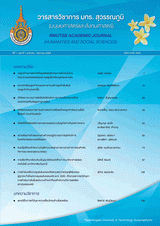ปัจจัยและกระบวนการตัดสินใจเลือกเดินทางมาท่องเที่ยวประเทศไทยของนักท่องเที่ยววัยสูงอายุชาวยุโรป
Main Article Content
Abstract
Factors affecting decision-making process of the senior tourists from Europe when choosing Thailand as a travel destination
The objectives of the research were to examine push and pull factors as well as the decision making process in choosing Thailand as a destination among elderly European tourists, and to explore the influence of push and pull factors affecting post purchase behavior of elderly European tourists. This research used the quantitative approach to design the study. The samples were the 50 years old elderly European tourists who travel to Thailand. The data was collected through the convenient sampling with 400 questionnaires. The statistics used to analyze data included frequency, percentage, mean, standard deviation, T-test, F-test analysis, factor analysis, and path analysis. The results of the study found that most elderly European tourists are mostly male who age between 50-54 years with a Bachelor degree study mostly like to travel to Thailand with family by preparing everything by themselves. Most of them have yearly income between 45,000 to 50,000 Euros and stay in Thailand for 16-30 days. The push factors for traveling as the physical need was most important, the need of learning, the need of self-fulfillment and the social need are as followed. The pull factors for choosing Thailand as a travel destination were tourism places, tourism attractions, and cultural and traditional respectively. The decision-making process for choosing Thailand as a travel destination was the step of post-purchase behavior in the most of mean score, the second was the main purpose of choosing in traveling, the third was the information searching. The results of the study found that push factors did not influence with post-purchase behavior but the pull factors influence with post-purchase behavior. It is shown that pull factors attract the elderly European tourists to have more post-purchase behavior.


